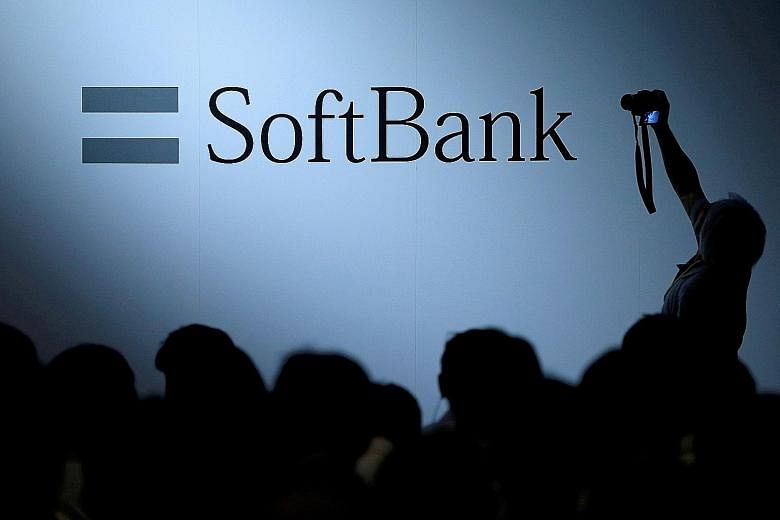TOKYO/SAN FRANCISCO/LONDON • Nvidia will buy British-based chip designer Arm from Japan's SoftBank Group for as much as US$40 billion (S$54.7 billion), the companies said yesterday, in a deal set to reshape the global semiconductor sector.
The sale puts a vital supplier to Apple and others across the industry under the control of a single player and faces likely pushback from regulators and rivals to Nvidia, the biggest US chip company by market capitalisation.
Within hours of the announcement, critics questioned how Arm would maintain its open approach under US ownership and at a time of friction with China.
Nvidia chief executive Jensen Huang emphasised that Arm would retain its neutral licensing model and expand it by licensing out Nvidia intellectual property for the first time. "We want to grow Arm and make it become even greater," he told analysts on a conference call.
For SoftBank, the sale marks an early exit from Arm, which it acquired for US$32 billion. Chief executive Masayoshi Son has lionised the potential of Arm but is slashing his stakes in major assets to raise cash.
It comes as SoftBank executives, frustrated at the group's stock performance, have held early-stage talks about taking the Japanese technology group private, a source told Reuters. Those talks could gain momentum following the Arm sale. SoftBank's shares soared 10 per cent in Tokyo.
Nvidia will pay SoftBank US$21.5 billion in shares and US$12 billion in cash, including US$2 billion on signing. The deal will see SoftBank and its US$100 billion Vision Fund, which has a 25 per cent stake in Arm, take a stake in Nvidia of between 6.7 per cent and 8.1 per cent.
Nvidia will license its flagship graphical processor unit through Arm's network of silicon partners.
It will build chips for devices like self-driving cars but also make its technology available for others.
Taiwan-born Huang has promised to site a new artificial intelligence research centre - equipped with its own supercomputer - at Arm's base in the university city of Cambridge, and said the company was ready to talk to the British government about expanding Arm's research efforts.
He stopped short of offering fresh job guarantees, however.
-
Semiconductor giant arming world's smartphones
-
Arm, the British semiconductor designer being sold by Japanese group Softbank to United States chip company Nvidia for up to US$40 billion (S$54.7 billion), is a technological power in smartphones across the globe.
Arm's technology has been used in more than 180 billion chips shipped worldwide, and is also present in cloud computing.
APPLE CORE
The company's current name was originally an acronym for Acorn Risc Machine, a processor that was chosen by Apple to power the US firm's first handheld device, the Newton, released in 1993.
Arm chip technology was present in the first iPhone released in 2007, and remains the bedrock of differing types of current mobile devices, including those made by Chinese giant Huawei.
WELL AHEAD OF INTEL
While it does not make chips, the designer licenses the architecture that enables devices to function. In terms of market penetration, Intel is a distant second.
Arm, based in the British university city of Cambridge and with a global staff of more than 6,500 people, says its technology reaches 70 per cent of the world's population.
Chips using its technology are also installed in medical instruments, base stations and servers.
INTERNET OF THINGS
Arm's move into interconnected home devices - the Internet of Things - was a key factor behind Softbank's 2016 decision to spend £24 billion (S$42.2 billion) to acquire the group.
It remains a key driver of the Nvidia takeover, according to equity analyst Nicholas Hyett at Hargreaves Lansdown.
Mr Hyett said: "By drawing on Arm's huge pool of active devices, as well as its technical know-how, Nvidia's hoping it can crack a technology with potential applications in cloud, smartphones, PCs, self-driving cars, robotics and the Internet of Things."
AGENCE FRANCE-PRESSE
Arm does not make chips but has created an instruction set architecture - the most fundamental intellectual property that underpins computing chips - on which it bases designs for computing cores.
It licenses its chip designs and tech to customers like Qualcomm, Apple and Samsung Electronics. Apple's forthcoming Mac computers will use Arm-based chips.
Arm will not become subject to US export controls under the deal, said Mr Huang.
The purchase, which is subject to regulatory approvals, including in Britain, the United States and China, is likely to come under close scrutiny in China, where thousands of companies from Huawei to small start-ups use Arm technology.
Nvidia will take control of the minority stake in joint venture Arm China. Arm is in dispute with the venture, which licenses chip architecture to local companies, over its management.
The Arm acquisition will put Nvidia into even more intense competition with rivals in the data centre chip market such as Intel and Advanced Micro Devices because Arm has been developing technology to compete with their chips.
In a possible direct challenge to those rivals, Mr Huang said it is "possible" Nvidia will build its own server chips based on Arm designs.
Nvidia is buying up technologies in parts of the booming data centre business where it does not currently play. In April, it completed the purchase of Israel-based Mellanox, which makes high-speed networking technology that is used in data centres and supercomputers.
The Arm deal is expected to close by March 2022. SoftBank could be paid an additional US$5 billion in cash or shares, depending on the chip designer's business performance, with Arm employees to be paid US$1.5 billion in Nvidia shares.
REUTERS

